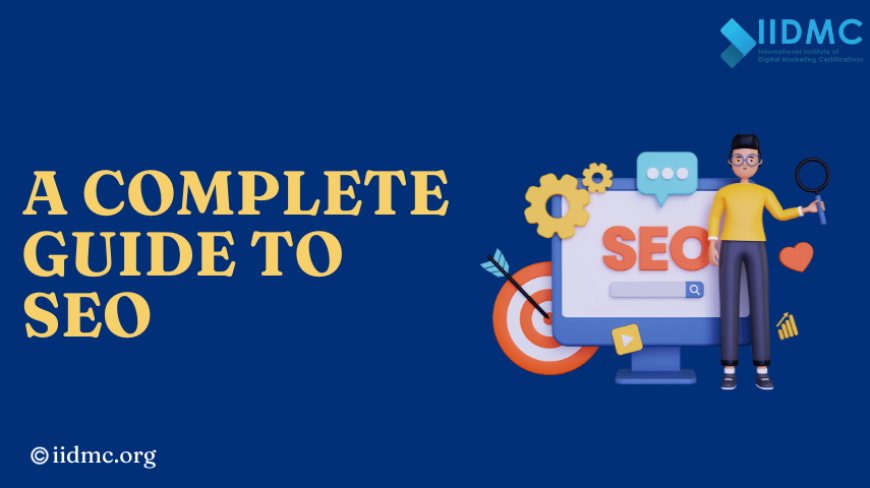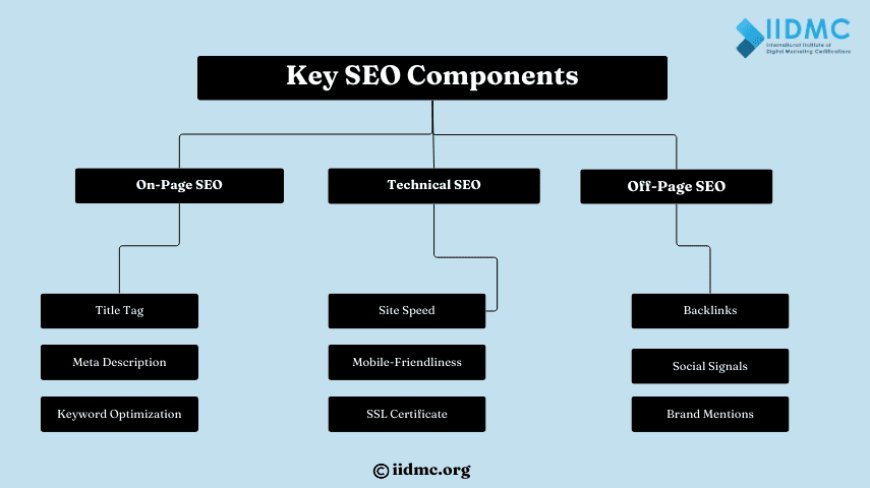A Complete Guide to SEO (Search Engine Optimization)
Learn the fundamentals of SEO, including on-page, off-page, and technical strategies to boost your website's visibility, drive organic traffic, and improve rankings.

SEO (Search Engine Optimization) is the practice of optimizing websites and online content to improve visibility in search engine results, driving organic traffic. Effective SEO can significantly boost your website’s rankings, attract more visitors, and enhance your online presence.
This guide covers the key elements of SEO, including technical, on-page, and off-page strategies, as well as insights into tools, best practices, and emerging trends.
Understanding SEO Basics
SEO is the process of improving a website's ranking on search engines like Google, Bing, and Yahoo. When users search for specific terms, search engines use complex algorithms to display the most relevant and authoritative content.
Why SEO is Important:
-
Increased Visibility: Higher rankings result in more traffic.
-
Credibility: High-ranking websites are perceived as more trustworthy.
-
Cost-effective: SEO drives organic (free) traffic as opposed to paid ads.
-
Long-Term Results: Effective SEO leads to sustainable growth over time.
Key SEO Components
SEO can be broken down into several key components:
1. On-Page SEO (Content Optimization)
On-page SEO refers to optimizing individual web pages to rank higher and earn more relevant traffic.
-
Title Tag: The title of your page (which appears in search results) should be concise (50–60 characters), descriptive, and include the target keyword.
-
Meta Description: A summary of the page content (160 characters), encouraging click-throughs.
-
Headings (H1, H2, H3, etc.): Use headings to structure your content. The H1 tag should contain the main keyword, and subsequent headers (H2, H3) should be used for subtopics.
-
Keyword Optimization: Use relevant keywords naturally throughout the content. Include primary keywords in key places like titles, meta descriptions, and headings.
-
URL Structure: URLs should be short, descriptive, and include the primary keyword.
-
Internal Linking: Link to other pages within your site to improve user navigation and distribute link equity.
-
Alt Text for Images: Describe images with relevant keywords to improve accessibility and help search engines understand your media.
2. Technical SEO (Site Performance & Structure)
Technical SEO refers to the technical aspects of your website that influence its ability to be crawled and indexed by search engines.
-
Site Speed: Websites that load faster rank better. Tools like Google PageSpeed Insights can help you test and optimize load times.
-
Mobile-Friendliness: Google uses mobile-first indexing, so your website must be optimized for mobile devices.
-
XML Sitemap: Ensure your website has an XML sitemap to help search engines crawl and index all your pages.
-
Robots.txt: This file instructs search engines on which pages to crawl and which to avoid.
-
SSL Certificate (HTTPS): Websites with HTTPS (encrypted sites) are given a ranking boost over non-secure HTTP sites.
-
Structured Data: Implement schema markup to help search engines better understand your content (e.g., product reviews, events, recipes).
-
Canonical Tags: Use to avoid duplicate content issues by telling search engines the preferred version of a page.
3. Off-Page SEO (External Factors)
Off-page SEO refers to actions taken outside your website to impact your rankings within search engine results.
-
Backlinks: Links from other websites to your content are crucial for SEO. Quality matters more than quantity—relevant, authoritative sites linking to you provide the most value.
-
Social Signals: Social media activity can indirectly influence SEO, as content that is widely shared can attract backlinks and traffic.
-
Brand Mentions: Unlinked mentions of your brand or website across the web can help with your site's credibility and rankings.

Keyword Research
Keyword research is the foundation of effective SEO. It involves identifying the terms and phrases your target audience uses when searching for information.
Steps for Keyword Research:
-
Brainstorm Topics: List broad topics related to your niche.
-
Use Keyword Tools: Tools like Google Keyword Planner, SEMrush, Ahrefs, and Ubersuggest can help identify search volume, competition, and related keywords.
-
Analyze Search Intent: Understand the user intent behind the keywords: informational, transactional, navigational, or commercial.
-
Long-Tail Keywords: These are longer, more specific phrases (e.g., “best vegan protein powder for muscle gain”). They typically have lower search volume but higher conversion rates.
-
Competitor Analysis: Study which keywords your competitors are ranking for and identify gaps or opportunities.
Keyword Optimization Tips:
-
Focus on user intent when choosing keywords.
-
Balance between high-volume and long-tail keywords.
-
Don't overuse keywords—ensure content reads naturally (avoid "keyword stuffing").
Content Strategy
Content is central to SEO. High-quality, engaging content attracts both users and search engines.
Content Types That Boost SEO:
-
Blog Posts: Regular, informative posts can help you rank for long-tail keywords and boost topical authority.
-
How-to Guides: Detailed guides can capture searches from users looking for solutions to specific problems.
-
Product Pages: Optimize eCommerce product pages to rank for transactional searches.
-
Videos: Video content, when optimized with relevant keywords, can rank in both search engines and platforms like YouTube.
Content Optimization Tips:
-
Use multimedia (images, videos, infographics) to enhance content.
-
Include call-to-action (CTA) prompts to engage users.
-
Keep content updated and relevant.
-
Focus on quality over quantity. A single high-quality post can outperform several low-quality ones.
Link Building
Building backlinks is one of the most effective ways to improve SEO.
Strategies for Acquiring Backlinks:
-
Guest blogging: Contribute valuable content to authoritative blogs in your niche.
-
Broken Link Building: Find broken links on relevant websites and offer your content as a replacement.
-
Skyscraper Technique: Identify high-ranking content in your niche, create even better content, and ask for links.
-
Influencer Outreach: Collaborate with influencers to earn backlinks from their sites.
-
Content Partnerships: Partner with others for co-authored content, which can lead to backlinks.
Quality of Links Matters:
-
Focus on links from relevant and authoritative sources.
-
Avoid spammy or low-quality links, as they can harm your rankings.
Measuring SEO Success
It’s crucial to track and measure the effectiveness of your SEO efforts.
Key Metrics to Track:
-
Organic Traffic: Monitor how many visitors come to your site through organic search results.
-
Keyword Rankings: Track your position for target keywords.
-
Bounce Rate: A high bounce rate can indicate poor content quality or irrelevant traffic.
-
Conversion Rate: Measure how well your SEO efforts lead to goal completions (sales, sign-ups, etc.).
-
Backlinks: Monitor the number and quality of backlinks pointing to your site.
SEO Tools for Tracking and Analysis:
-
Google Analytics offers insights into site traffic, user behavior, and conversions.
-
Google Search Console: Shows how Google crawls and indexes your site and highlights issues.
-
Ahrefs/SEMrush: These tools provide keyword research, backlink analysis, and competitor insights.
-
Moz offers comprehensive SEO insights, including page optimization and backlink tracking.
SEO Best Practices and Emerging Trends
a) AI & Machine Learning
Google’s algorithms, including RankBrain and BERT, are powered by AI. These algorithms understand the context better than ever, so SEO will need to focus on creating content that answers real questions and matches user intent.
b) Voice Search Optimization
With the rise of virtual assistants like Siri and Alexa, voice search is growing. Optimize for conversational keywords and long-tail phrases.
c) User Experience (UX)
User signals, such as time on site and bounce rates, are becoming more important. Improve your site’s design, usability, and mobile experience.
d) Core Web Vitals
Google now measures how well your site performs in terms of loading speed, interactivity, and visual stability (Core Web Vitals). Sites that perform better in these metrics will rank higher.
e) E-A-T (Expertise, Authoritativeness, Trustworthiness)
Google values content from authoritative and trustworthy sources, especially in niches like health, finance, and law. Demonstrating expertise through quality content and credible backlinks is key.
To truly master SEO, you don’t need a formal certification, but earning one can help boost your credibility and knowledge. A certification shows you understand SEO principles and practices, which can be valuable, especially if you're aiming to work in digital marketing.
Why Consider SEO Certification?
-
Credibility: A certification from a reputable institution can add credibility to your resume or portfolio.
-
Structured Learning: Certification programs typically offer a structured curriculum, ensuring you cover all important aspects of SEO.
-
Stay Updated: SEO is an ever-evolving field, and many certification programs are updated regularly to reflect the latest trends, tools, and best practices.
Available Certifications In IIDMC
IIDMC (International Institute of Digital Marketing & Certification) offers a range of certifications to boost your digital skills:
To master SEO, consider enrolling in a comprehensive course with for hands-on learning and practical insights. For certification, IIDMC offers a structured program to enhance your expertise and credibility and keep you updated on the latest SEO trends. These resources will guide you in building a strong SEO career.





























